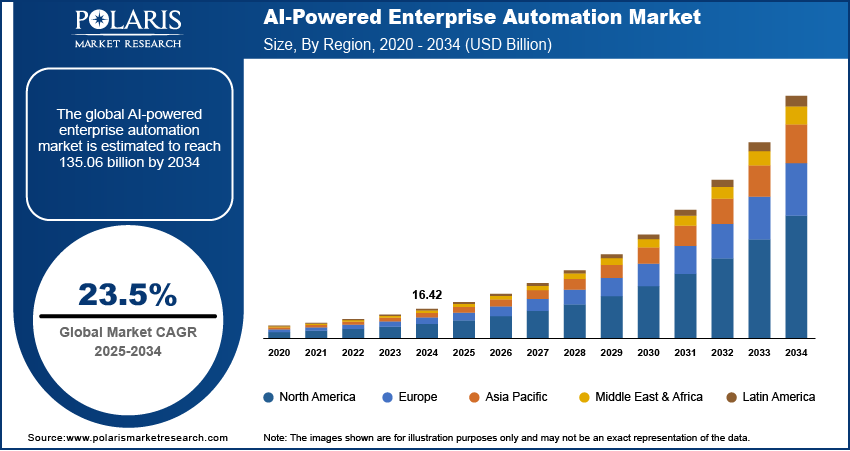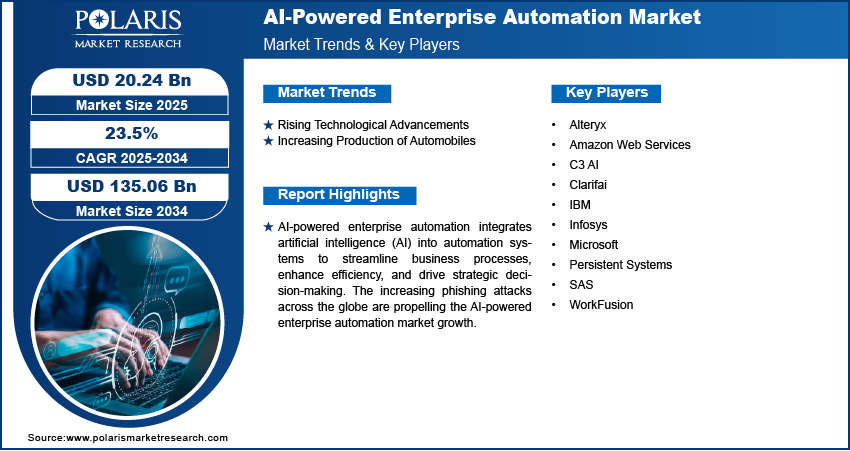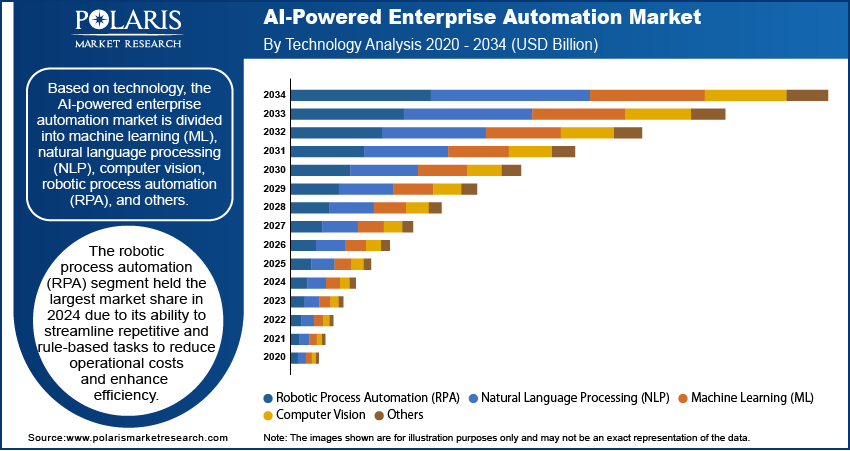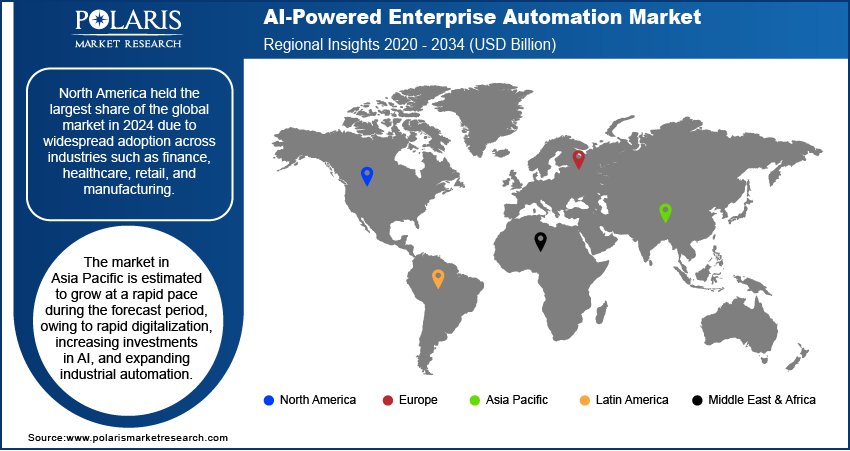
AI-Powered Enterprise Automation Market Size, Share, Trends, Industry Analysis Report: By Technology [Machine Learning (ML), Natural Language Processing (NLP), Computer Vision, Robotic Process Automation (RPA), and Others], Application, Deployment Mode, Organization Size, and Region (North America, Europe, Asia Pacific, Latin America, and Middle East & Africa) – Market Forecast, 2025–2034
- Published Date:Apr-2025
- Pages: 129
- Format: PDF
- Report ID: PM5470
- Base Year: 2024
- Historical Data: 2020-2023
AI-Powered Enterprise Automation Market Overview
The global AI-powered enterprise automation market size was valued at USD 16.42 billion in 2024. The market is projected to grow from USD 20.24 billion in 2025 to USD 135.06 billion by 2034, exhibiting a CAGR of 23.5% during 2025–2034.
AI-powered enterprise automation integrates artificial intelligence (AI) into automation systems to streamline business processes, enhance efficiency, and drive strategic decision-making. This integration empowers organizations to automate not just repetitive tasks but also complex workflows, leveraging AI's ability to analyze vast amounts of data, identify patterns, and provide actionable insights. AI-powered enterprise automation is used across various industries to automate tasks that were previously manual or rule-based. It is widely used in the financial industry for fraud detection, risk assessment, and personalized banking services. Companies such as HSBC have successfully implemented AI algorithms to analyze transaction patterns in real-time, significantly enhancing their ability to detect fraudulent activities.
The increasing phishing attacks across the globe are propelling the AI-powered enterprise automation market growth. According to a report from the Anti-Phishing Working Group, 932,923 phishing attacks were recorded in Q3 2024, up from 877,536 in the previous quarter. This surge in phishing attacks is driving businesses to turn to AI-driven enterprise automation to streamline cybersecurity operations and improve efficiency. AI-powered automation tools help businesses detect, analyze, and contain threats at scale by analyzing deeper aspects of messages, such as context and sender behavior patterns. Moreover, phishing attacks often target employees through emails, messages, or fake websites, exploiting human vulnerabilities. AI-powered automation addresses this by integrating with communication platforms and monitoring interactions for suspicious activity.

To Understand More About this Research: Request a Free Sample Report
The AI-powered enterprise automation market demand is driven by the growing digitalization of businesses. Companies are relying on digital platforms for communication, transactions, and customer interactions, creating a surge in data volume and complexity. Manual processes struggle to keep pace with this rapid expansion, leading organizations to adopt AI-driven enterprise automation systems. These systems analyze data in real time, extract valuable insights, and automate decision-making, allowing companies to enhance efficiency and accuracy while reducing operational costs. Furthermore, security and compliance challenges intensify as digitalization expands. Enterprises collect and store vast amounts of sensitive data, making them vulnerable to cyber threats and regulatory risks. AI-powered enterprise automation helps organizations monitor compliance, detect security breaches, and enforce data protection policies in real-time. Hence, as digitalization expands, the demand for AI-powered enterprise automation also increases.
AI-Powered Enterprise Automation Market Dynamics
Rising Technological Advancements
Companies are leveraging advanced technologies such as cloud computing, IoT, and 5G to process massive amounts of data in real time. Traditional manual workflows cannot handle this scale, creating the need for AI-driven enterprise automation to manage data processing, decision-making, and operational execution seamlessly. Businesses are integrating AI-powered automation to reduce human error, enhance productivity, and drive innovation in an increasingly complex environment. New developments in artificial intelligence and machine learning are further pushing enterprises to adopt smarter automation solutions. Advanced AI-powered enterprise automation enables existing systems to learn from historical data, adapt to changing conditions, and improve decision-making over time. Businesses are widely implementing these technologies to automate complex processes, optimize resource allocation, and predict future trends with higher accuracy. Cybersecurity advancements are also contributing to the growing demand for AI-driven enterprise automation as it plays a crucial role in detecting cyber threats, preventing data breaches, and ensuring regulatory compliance. Thus, rising technological advancements are driving the AI-powered enterprise automation market expansion.
Increasing Production of Automobiles
Automakers are producing vehicles at a larger scale to meet rising consumer demand, requiring advanced automation solutions to streamline assembly lines and supply chain operations. For instance, as per the data published by the European Automobile Manufacturers' Association, 85.4 million motor vehicles were produced globally in 2022, an increase of 5.7% compared to 2021. AI-powered enterprise automation solutions help optimize production scheduling, monitor equipment performance, and ensure quality control, allowing manufacturers to reduce errors, minimize waste, and increase overall production capacity and efficiency. Supply chain complexity further grows with the expansion of automobile manufacturing, making AI-powered automation essential for logistics and inventory management. Automakers source raw materials and components from multiple suppliers, increasing the need for real-time tracking and predictive analytics. AI-driven enterprise automation enables manufacturers to monitor supply chain disruptions, forecast demand, and optimize inventory levels.
Automobile manufacturers are also relying on AI-powered automation to enhance quality assurance and defect detection. Traditional manual inspections cannot effectively identify all defects, especially as production scales up. AI-driven enterprise automation systems use computer vision and machine learning to analyze vehicle components, detect anomalies, and ensure that each unit meets industry standards. Therefore, the growing production of automobiles is propelling the AI-powered enterprise automation market demand.

AI-Powered Enterprise Automation Market Segment Insights
AI-Powered Enterprise Automation Market Evaluation by Technology Insights
Based on technology, the AI-powered enterprise automation market is divided into machine learning (ML), natural language processing (NLP), computer vision, robotic process automation (RPA), and others. The robotic process automation (RPA) segment held the largest AI-powered enterprise automation market share in 2024 due to its ability to streamline repetitive and rule-based tasks to reduce operational costs and enhance efficiency. Financial services, healthcare, and manufacturing sectors are implementing RPA to automate data entry, invoice processing, customer support, and compliance management. Organizations prefer this technology as it seamlessly integrates with existing enterprise systems without requiring extensive modifications. The growing need to improve productivity while minimizing human errors further accelerated its adoption. Additionally, advancements in cognitive automation, which combines RPA with artificial intelligence, have expanded its capabilities, enabling businesses to automate more complex workflows and decision-making processes.
AI-Powered Enterprise Automation Market Assessment by Application Insights
In terms of application, the AI-powered enterprise automation market is segregated into customer support, supply chain and logistics optimization, human resources, finance and accounting, and IT operations. The finance and accounting segment is estimated to grow at a rapid pace in the coming years. Organizations are increasingly adopting AI-powered enterprise automation to streamline financial processes such as invoice processing, expense management, fraud detection, and financial forecasting. AI-powered solutions in the financial sector analyze large datasets, identify anomalies, and generate actionable insights, enabling businesses to make data-driven decisions and reduce manual errors. The rising complexity of regulatory compliance and the need for real-time financial reporting is further accelerating the adoption of AI-powered enterprise automation in the financial sector.

AI-Powered Enterprise Automation Market Regional Analysis
By region, the AI-powered enterprise automation market report provides insights into North America, Europe, Asia Pacific, Latin America, and the Middle East & Africa. North America held the largest AI-powered enterprise automation market share in 2024 due to widespread adoption across industries such as finance, healthcare, retail, and manufacturing. Businesses in the region are investing heavily in enterprise automation to enhance operational efficiency, reduce costs, and improve decision-making. The presence of major AI technology providers, including Google, IBM, Microsoft, and Amazon, has accelerated innovation and deployment of AI-powered enterprise automation solutions. Enterprises in the US have led the adoption, leveraging AI-powered solutions for process automation, cybersecurity, and customer engagement. Government initiatives promoting digital transformation and AI research have also fueled AI-powered enterprise automation market expansion. Additionally, a highly developed IT infrastructure and early adoption of emerging technologies have contributed to the region’s dominance. The growing demand for AI-driven automation in financial services, where companies focused on fraud detection, risk management, and compliance automation, has played a key role in driving the region’s leading market position.
The market in Asia Pacific is estimated to grow at a rapid pace during the forecast period, owing to rapid digitalization, increasing investments in AI, and expanding industrial automation. Countries such as China, Japan, and India are driving market expansion by integrating AI across various sectors, including manufacturing, e-commerce, and telecommunications. China, the dominant country in the region, is leading the adoption with strong government support for AI development and significant investments from both public and private sectors. Businesses in China are utilizing AI-driven enterprise automation to enhance production efficiency, optimize logistics, and improve financial services. Japan’s focus on robotics and automation in manufacturing further strengthens the region’s market presence. India’s growing IT sector and the increasing use of AI-powered enterprise automation in customer support and financial services are contributing to the region’s rising market share. For instance, according to the National Association of Software and Service Companies (NASSCOM), the Indian IT industry’s revenue touched USD 227 billion in FY22, reflecting a 15.5% YoY growth.

AI-Powered Enterprise Automation Market – Key Players and Competitive Insights
Major market players are investing heavily in research and development in order to expand their product portfolio, which will help the AI-powered enterprise automation market grow even more. These market participants are also undertaking a variety of strategic activities to expand their global footprint, with important market developments including innovative launches, international collaborations, higher investments, and mergers and acquisitions between organizations.
The AI-powered enterprise automation market is fragmented, with the presence of numerous global and regional market players. Major players in the market include Amazon Web Services, IBM, Microsoft, SAS, C3 AI, Clarifai, Alteryx, Infosys, Persistent Systems, and WorkFusion.
IBM is a multinational technology company headquartered in Armonk, New York. IBM is renowned for its extensive range of hardware and software products, including computers, servers, storage systems, and networking equipment. The company’s AI-powered enterprise automation solutions are designed to enhance operational efficiency, drive innovation, and unlock new business value across various industries. One of the key platforms that IBM offers for this purpose is IBM Watson, which is a comprehensive AI platform for businesses.
Clarifai is a major AI company that specializes in computer vision, natural language processing, and audio recognition. Founded in 2013, the company is headquartered in Wilmington, Delaware, with additional offices in San Francisco and Tallinn, Estonia. Clarifai's platform is designed to help developers and businesses build, deploy, and manage AI models across various applications, including image, video, text, and audio data.
List of Key Companies in AI-Powered Enterprise Automation Market
AI-Powered Enterprise Automation Industry Developments
March 2025: Avaamo, an enterprise AI company specializing in conversational AI, introduced Avaamo Agents, a new set of digital workers designed to enhance business operations through automation and AI-driven efficiency.
June 2024: Automation Anywhere, a global player in AI-powered automation, announced its new AI + Automation Enterprise System that puts AI to work with automation to drive exponential outcomes.
AI-Powered Enterprise Automation Market Segmentation
By Technology Outlook (Revenue, USD Billion, 2020–2034)
- Machine Learning (ML)
- Natural Language Processing (NLP)
- Computer Vision
- Robotic Process Automation (RPA)
- Others
By Application Outlook (Revenue, USD Billion, 2020–2034)
- Customer Support
- Supply Chain and Logistics Optimization
- Human Resources
- Finance and Accounting
- IT Operations
By Deployment Mode Outlook (Revenue, USD Billion, 2020–2034)
- Cloud-Based
- On-Premises
- Hybrid
By Organization Size Outlook (Revenue, USD Billion, 2020–2034)
- Small and Medium Enterprises (SMEs)
- Large Enterprises
By Regional Outlook (Revenue, USD Billion, 2020–2034)
- North America
- US
- Canada
- Europe
- Germany
- France
- UK
- Italy
- Spain
- Netherlands
- Russia
- Rest of Europe
- Asia Pacific
- China
- Japan
- India
- Malaysia
- South Korea
- Indonesia
- Australia
- Vietnam
- Rest of Asia Pacific
- Middle East & Africa
- Saudi Arabia
- UAE
- Israel
- South Africa
- Rest of Middle East & Africa
- Latin America
- Mexico
- Brazil
- Argentina
- Rest of Latin America
AI-Powered Enterprise Automation Market Report Scope
|
Report Attributes |
Details |
|
Market Size Value in 2024 |
USD 16.42 billion |
|
Market Size Value in 2025 |
USD 20.24 billion |
|
Revenue Forecast by 2034 |
USD 135.06 billion |
|
CAGR |
23.5% from 2025 to 2034 |
|
Base Year |
2024 |
|
Historical Data |
2020–2023 |
|
Forecast Period |
2025–2034 |
|
Quantitative Units |
Revenue in USD billion and CAGR from 2025 to 2034 |
|
Report Coverage |
Revenue Forecast, Market Competitive Landscape, Growth Factors, and Trends |
|
Segments Covered |
|
|
Regional Scope |
|
|
Competitive Landscape |
|
|
Report Format |
|
|
Customization |
Report customization as per your requirements with respect to countries, regions, and segmentation. |
FAQ's
The global AI-powered enterprise automation market size was valued at USD 16.42 billion in 2024 and is projected to grow to USD 135.06 billion by 2034.
The global market is projected to register a CAGR of 23.5% during the forecast period.
North America had the largest share of the global market in 2024.
Some of the key players in the market are Amazon Web Services, IBM, Microsoft, SAS, C3 AI, Clarifai, Alteryx, Infosys, Persistent Systems, and WorkFusion.
The robotic process automation (RPA) segment dominated the AI-powered enterprise automation market revenue in 2024.
The finance and accounting segment is expected to grow at the fastest pace in the coming years.
